Starting from:
$12.95
John F. Kennedy Assassination National Security Agency (NSA) Files
John F. Kennedy Assassination National Security Agency (NSA) Files
2,484 pages of National Security Agency, NSA, files related to the assassination of President John F. Kennedy. Some material was not declassified until November 2017.
The files date from 1963 to 1995. Much of the material dating near the time of the assassination is composed of Communications Intelligence/COMINT reports. These are reports of technical and intelligence information derived from foreign communications by means other than those intended by the sender and received by others than the intended recipients. The specific correspondents in these intercepted communications are usually withheld. Much of the material in this set deals with the NSA’s cooperation with the ARRB.
The documents include:
An NSA memo about its determination as to if any of the material given to it to examine by the warren Commission was written in code.
A January 15, 1963 NSA Communications Intelligence/COMINT report on a plan in Cuba to assassinate Fidel Castro.
National Security Agency SIGINT Command Center Event Logs from November 22 to November 23, 1963.
A November 23, 1963 NSA signal intelligence report from Fort Meade Maryland, reporting that the Cuban military sent an alert to its units translated as "a state of alert is ordered for all personnel. Be ready to repel aggression."
Various memos concerning international press reaction to the assassination of President Kennedy.
Memos report on the deterioration of relations between Mexico and Cuba after the assassination.
A 1964 letter to General Counsel Lee Richards, of the President's Commission on the Assassination of President Kennedy from NSA Director Lt Gen Gordon A. Blake, concerning the examination by NSA cryptologists of materials belonging to Lee Harvey Oswald.
Correspondences from the NSA to House and Senate Committees investigating the assassination of President Kennedy, concerning related NSA documents.
Correspondences and internal NSA memos concerning compliance with requests from the Assassination Records Review Board.
A series of news articles collected by the NSA concerning the Kennedy Assassination published in the early 1990's beginning after the release of the Oliver Stone film "JFK."
ASSASSINATION RECORDS REVIEW BOARD FINAL REPORT
In addition to the 2,484 pages of National Security Agency files, is the Assassination Records Review Board Final Report. This 227-page report contains information on the challenges the Board had in working with the NSA, concerning releasing Kennedy assassination related documents.
The assassination of President John F. Kennedy, the thirty-fifth President of the United States, took place on Friday, November 22, 1963, in Dallas, Texas at 12:30p.m. Kennedy was fatally wounded by gunshots while riding with his wife Jacqueline in a presidential motorcade through Dealey Plaza. President Kennedy was only 46 years old and had served less than three years in office.
The official investigation by the Warren Commission was conducted over a ten- month period, and its report was published in September 1964. The Warren Commission concluded that the assassination was carried out solely by Lee Harvey Oswald, an employee of the Texas School Book Depository in Dealey Plaza. This conclusion initially met with widespread support among the American public. A 1966 Gallup poll showed that 54 percent of American did not believe ina plot. Later polls show a majority of the public hold beliefs contrary to the Commission's findings. The United States House Select Committee on Assassinations (HSCA) concluded in 1979 that Kennedy was assassinated by Oswald probably as a result of a conspiracy. This conclusion was based on taped acoustic evidence, which has since been called into question. The assassination is still the subject of widespread speculation and has spawned a number of theories.
The President John F. Kennedy Assassination Records Collection Act of 1992 created the Assassination Records Review Board as an independent agency to re- examine for release, the assassination-related records that federal agencies still regarded as too sensitive to open to the public. The Board finished its work on September 30, 1998.
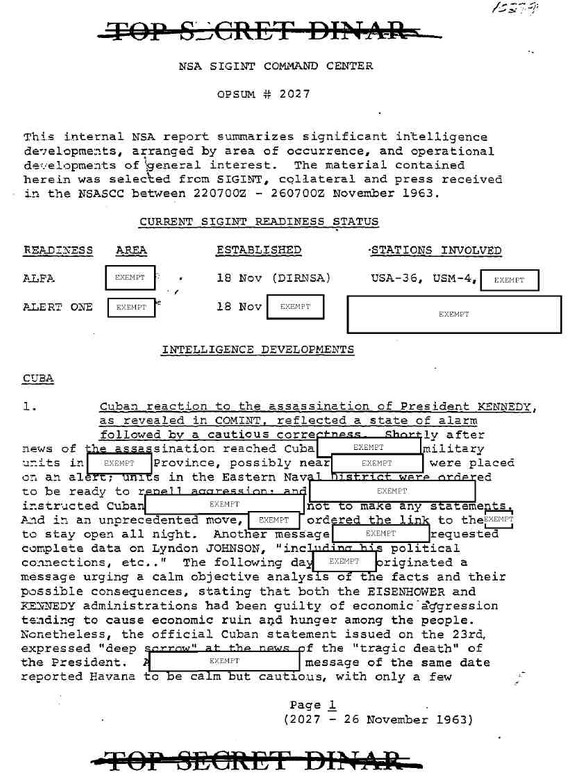
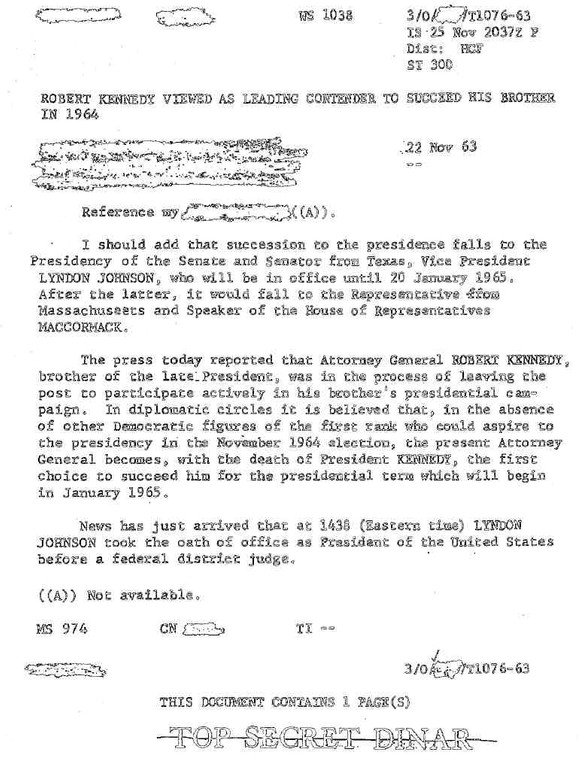
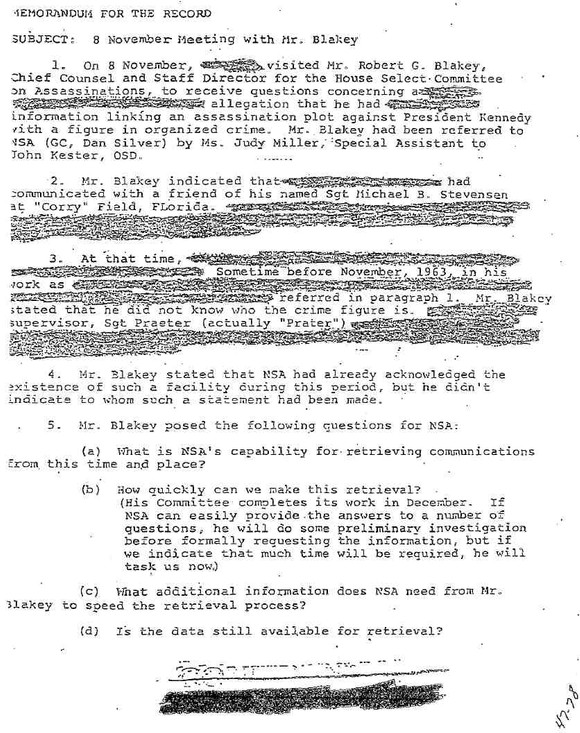
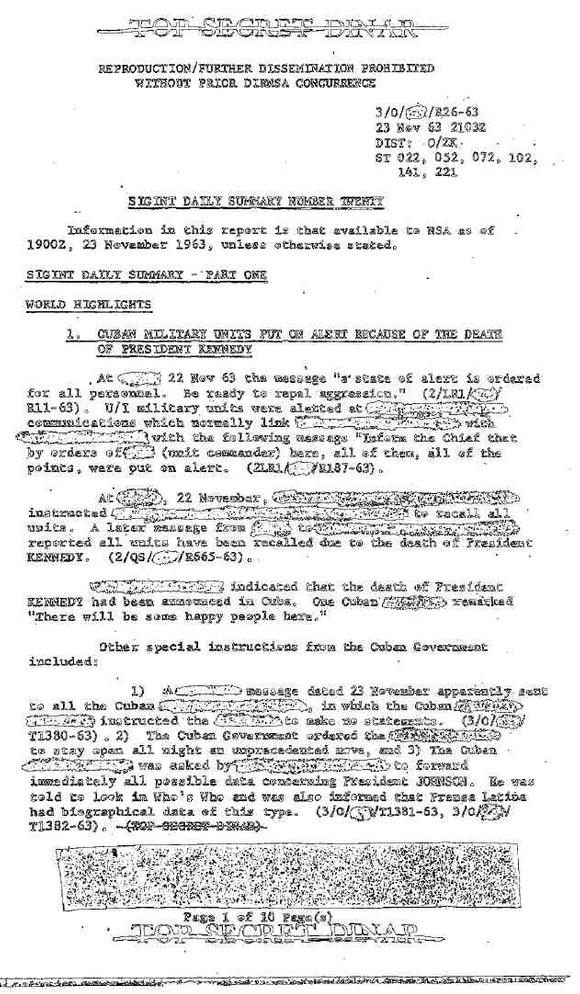
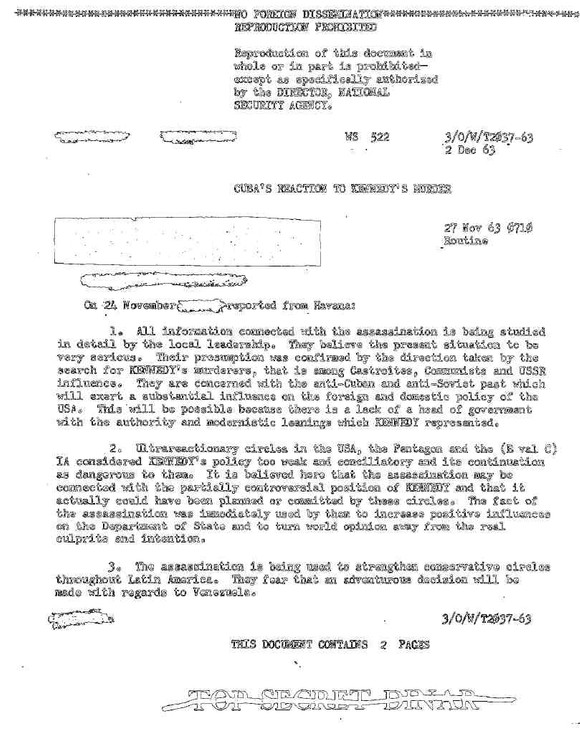
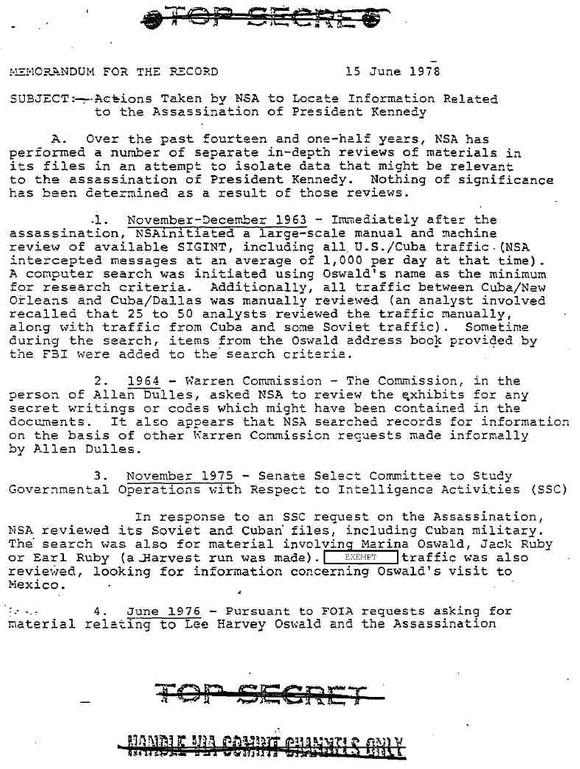
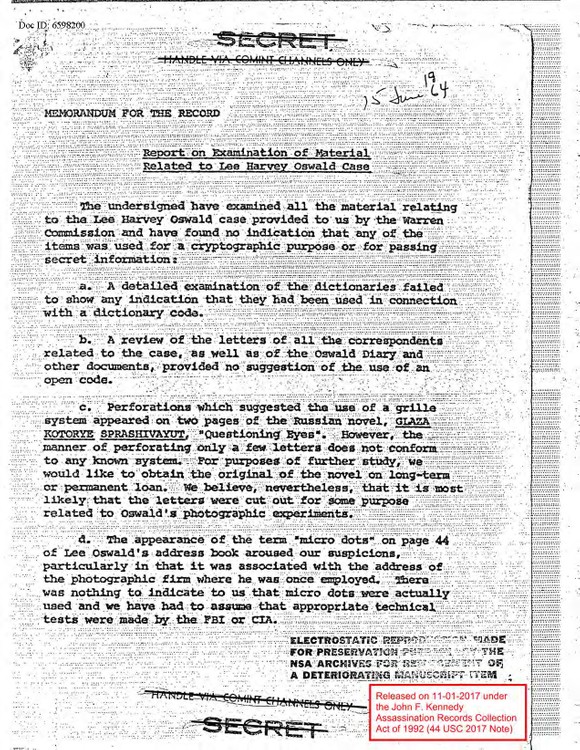

2,484 pages of National Security Agency, NSA, files related to the assassination of President John F. Kennedy. Some material was not declassified until November 2017.
The files date from 1963 to 1995. Much of the material dating near the time of the assassination is composed of Communications Intelligence/COMINT reports. These are reports of technical and intelligence information derived from foreign communications by means other than those intended by the sender and received by others than the intended recipients. The specific correspondents in these intercepted communications are usually withheld. Much of the material in this set deals with the NSA’s cooperation with the ARRB.
The documents include:
An NSA memo about its determination as to if any of the material given to it to examine by the warren Commission was written in code.
A January 15, 1963 NSA Communications Intelligence/COMINT report on a plan in Cuba to assassinate Fidel Castro.
National Security Agency SIGINT Command Center Event Logs from November 22 to November 23, 1963.
A November 23, 1963 NSA signal intelligence report from Fort Meade Maryland, reporting that the Cuban military sent an alert to its units translated as "a state of alert is ordered for all personnel. Be ready to repel aggression."
Various memos concerning international press reaction to the assassination of President Kennedy.
Memos report on the deterioration of relations between Mexico and Cuba after the assassination.
A 1964 letter to General Counsel Lee Richards, of the President's Commission on the Assassination of President Kennedy from NSA Director Lt Gen Gordon A. Blake, concerning the examination by NSA cryptologists of materials belonging to Lee Harvey Oswald.
Correspondences from the NSA to House and Senate Committees investigating the assassination of President Kennedy, concerning related NSA documents.
Correspondences and internal NSA memos concerning compliance with requests from the Assassination Records Review Board.
A series of news articles collected by the NSA concerning the Kennedy Assassination published in the early 1990's beginning after the release of the Oliver Stone film "JFK."
ASSASSINATION RECORDS REVIEW BOARD FINAL REPORT
In addition to the 2,484 pages of National Security Agency files, is the Assassination Records Review Board Final Report. This 227-page report contains information on the challenges the Board had in working with the NSA, concerning releasing Kennedy assassination related documents.
The assassination of President John F. Kennedy, the thirty-fifth President of the United States, took place on Friday, November 22, 1963, in Dallas, Texas at 12:30p.m. Kennedy was fatally wounded by gunshots while riding with his wife Jacqueline in a presidential motorcade through Dealey Plaza. President Kennedy was only 46 years old and had served less than three years in office.
The official investigation by the Warren Commission was conducted over a ten- month period, and its report was published in September 1964. The Warren Commission concluded that the assassination was carried out solely by Lee Harvey Oswald, an employee of the Texas School Book Depository in Dealey Plaza. This conclusion initially met with widespread support among the American public. A 1966 Gallup poll showed that 54 percent of American did not believe ina plot. Later polls show a majority of the public hold beliefs contrary to the Commission's findings. The United States House Select Committee on Assassinations (HSCA) concluded in 1979 that Kennedy was assassinated by Oswald probably as a result of a conspiracy. This conclusion was based on taped acoustic evidence, which has since been called into question. The assassination is still the subject of widespread speculation and has spawned a number of theories.
The President John F. Kennedy Assassination Records Collection Act of 1992 created the Assassination Records Review Board as an independent agency to re- examine for release, the assassination-related records that federal agencies still regarded as too sensitive to open to the public. The Board finished its work on September 30, 1998.








1 file (307.8MB)



